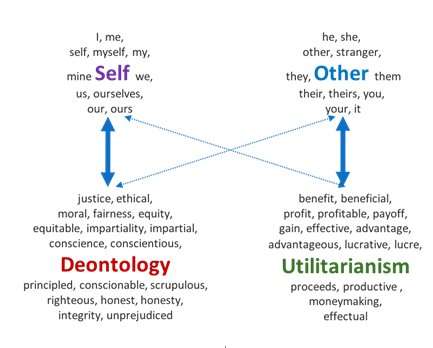#Scientists uncover self-other moral bias at the conceptual level

“#Scientists uncover self-other moral bias at the conceptual level”

Self–other bias can engender disagreement, misunderstanding, and conflict in real-world interactions. Moral perspectives are powerful in shaping thoughts and behaviors. Whether there is a self–other moral bias is poorly understood.
A research team led by Dr. Rao Lilin from the Institute of Psychology of the Chinese Academy of Sciences demonstrated the self–other moral bias at the conceptual level and found that the self–other moral bias was expressed in natural language on the Internet.
In a previous study, using moral dilemmas, Dr. Rao’s team demonstrated a self–other bias in moral judgment. When faced with moral dilemmas, people were more deontological (less utilitarian) when they made decisions themselves than when they surmised what a stranger would do.
In this work, the researchers conducted three studies. Study 1 used the Implicit Association Test to examine the implicit association between self–other and deontology–utilitarianism. Study 2 used the evaluative priming task to further confirm the results of Study 1. Study 3 investigated the association between self and other words and deontological and utilitarian words in large bodies of natural-language text (i.e., a standard corpus of English-language text from the Internet).
In Studies 1 and 2, the researchers consistently observed that the association of deontological words (in Chinese) with self words was stronger than with other words and that the association of utilitarian words with other words was stronger than with self words. In Study 3, they further demonstrated that the self–other bias moral could be reflected in natural language. These results suggested that the self–other moral bias were generalized, independent of specific contexts.
The findings of the self–other moral bias have important implications for communication. In many real-life situations, an action can be justified by deontology and utilitarianism at the same time. An awareness of the self–other moral bias may facilitate a better understanding of others’ attitudes and behaviors.
Ming-Hui Li et al, Self–other moral bias: Evidence from implicit measures and the Word-Embedding Association Test, Personality and Individual Differences (2021). DOI: 10.1016/j.paid.2021.111107
Citation:
Scientists uncover self-other moral bias at the conceptual level (2021, July 29)
retrieved 29 July 2021
from https://medicalxpress.com/news/2021-07-scientists-uncover-self-other-moral-bias.html
This document is subject to copyright. Apart from any fair dealing for the purpose of private study or research, no
part may be reproduced without the written permission. The content is provided for information purposes only.
If you liked the article, do not forget to share it with your friends. Follow us on Google News too, click on the star and choose us from your favorites.
For forums sites go to Forum.BuradaBiliyorum.Com
If you want to read more Like this articles, you can visit our Science category.